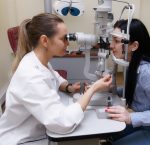
If you never had any issues with your eyes, you probably don’t know what is an optician supposed to do.
This article will explain what is an optician doing while at work, and not only that.
You might find this presentation interesting even if you already knew what this occupation is all about.
Regardless of the situation you’re in, read on!
Page Navigation
What Is An Optician?
You’ll have a better understanding of the responsibilities opticians have if you were to know what exactly they are.
Opticians are a pretty important part of the healthcare industry.
Their field of expertise has to do with the eyes, just like that of optometrists and ophthalmologists.
Usually, people go directly to an optician when they have problems with their eyes.
However, these professionals may identify some eye-related issues, but they don’t provide eye care.
In turn, they are likely to recommend a visit to an optometrist or an ophthalmologist first.
This is because these professionals have more training and knowledge in the field.
Optician Job Description
It’s time to learn what the job of an optician is all about.
The job’s description is where you actually discover what is an optician doing, after all.
The main job of these technicians is to interpret eyewear prescriptions and help the patient choose the best eyewear for them.
The eyewear can be:
- Glasses (or spectacles)
- Contact lenses
- Magnifying glasses
- Telescopic spectacles
For those who don’t know, the last 2 devices are used by those who suffer from low vision.
Professionals need specific training for dispensing eyewear for patients with low vision.
In order for a person to choose the best pair of blinkers, the following need to be taken into consideration:
- The prescription itself
- The patient’s budget
- Their preferences
In fact, a person could need reading glasses, distance vision glasses, as well as sunglasses.
Buying 3 different pairs of glasses could become rather pricey.
An optometrist can explain how a specific type of lenses can meet all these 3 needs, leading the patient to buy just a single pair of glasses.
The lenses will have a higher cost, but the advantages are:
- The final price can be lower than for 3 different pairs of spectacles
- The patient will wear the same pair throughout the day, without risking forgetting or losing any
Teaching the person how to care for their new eye gear is another job responsibility of an optician.
This is needed when the person has to wear glasses for the first time, or if they switch from glasses to contact lenses.
Besides directly interacting with patients, opticians also have to communicate with the labs making the eyewear.
Opticians will have to be very careful when keeping track of:
- Appointments
- Inventory
- Prescriptions and orders
These technicians usually perform follow-ups with the patients as well.
Folks who break their frames or lenses generally go to an optician’s office to have the items repaired.
Best Optician Candidate
At this point, it’s easy to see that not just anyone can be an optician.
The ideal candidate for this position has excellent communication skills since they have to interact both with patients and labs.
These individuals are easily described as:
- Assertive,
- Confident,
- Energetic,
- Enthusiastic,
- Extroverted,
- Optimistic
- Detail-oriented
All these attributes are very useful when talking to others and especially when trying to convince them to buy something.
However, while having those characteristics is a good thing, you’ll need more tools if you consider a career as an optician.
For starters, a high school diploma or GED is rather mandatory for this occupation.
You also can’t work as an optician if you’re under the age of 18.
Depending on the state you live in, you might need a license.
The states requiring a license for opticians are:
- Alaska
- Arizona
- Arkansas
- California
- Connecticut
- Florida
- Georgia
- Hawaii
- Kentucky
- Massachusetts
- Nevada
- New Jersey
- New York
- North Carolina
- Ohio
- Rhode Island
- South Carolina
- Tennessee
- Vermont
- Virginia
- Washington
If you live in a state where the license is not mandatory, it’s still a good idea to earn one or some other form of certification.
Being certified or licensed will:
- Show you already know what your job is all about
- Allow you to ask for a higher salary
- Make you appear professional
Earning a credential means you’ll need to receive some training as well.
Let’s learn more about the training itself, as it’s an important part of the job of an optician.

Optician Training
Those who want to become opticians can train through the following paths:
- Apprenticeship
- Educational program
Choosing the apprenticeship route means you’ll have to work for either an optometrist or ophthalmologist who works for a vision care center.
The apprenticeship period can last between 13 months and up to 5 years.
This all depends on each business open to offering such programs.
Those who choose the educational program can spend between 1 and 2 years in school.
With an education of one year, you’ll qualify for a certificate.
The educational program lasting 2 years will qualify you for an Associates’ degree.
Once your training is over, regardless of the path you chose, you are ready to pass exams that will bring about licensure.
Optician Certification
To become certified, you’ll need to pass the American Board of Opticianry (ABO) exam.
This exam will allow you to work only with glasses.
The fee for this test is $225.
You can choose to take the National Opticianry Competency Exam (NOCE) instead if you prefer or need to become licensed.
Either exam can be taken in English or Spanish and the time limit of them is 2 hours.
Generally, fulfilling the prerequisites of becoming an optician is enough to qualify you to take the exam.
In some cases, you might have to fulfill additional requirements.
If you want to work with contact lenses as well, you’ll need to pass the Contact Lens Registry Examination (CLRE).
This exam is also available in English and Spanish and it also has a duration of 2 hours.
You’ll need to pay a fee for this test as well.
Both the NOCE and CLRE have 3 levels of difficulty, based on the experience of the candidate.
The levels are:
- American Board of Opticianry Certification (ABOC)
- ABO Advanced Certification (ABO-AC)
- ABO Masters Certification (ABOM)
- National Contact Lens Certification (NCLEC)
- NCLE Advanced Certification (NCLE-AC)
- NCLE Masters Certification (NCLEM)
Those who want to obtain a higher certification will need to complete these prerequisites:
- Earn first the lower certification
- Accumulate at least 3 years of experience with that credential
- Renew your initial certification at least once
What you should know is that you’ll have to renew your credentials.
The renewal period is between 1 and 3 years, depending on your jurisdiction.
For this, you’ll need to complete a series of additional classes and pay some additional fees.
If you want to start an optician office, you’ll need to obtain additional licenses for operating a business.
Make sure you check with your local authorities for this aspect.
Conclusion
We hope that now you have a better idea of what opticians do when they go to work.
The work itself is not very demanding physically, however, you might have to carry some boxes around.
We’re certain that those who were already considering a career in this field now have fewer questions related to the responsibilities of their future job.








